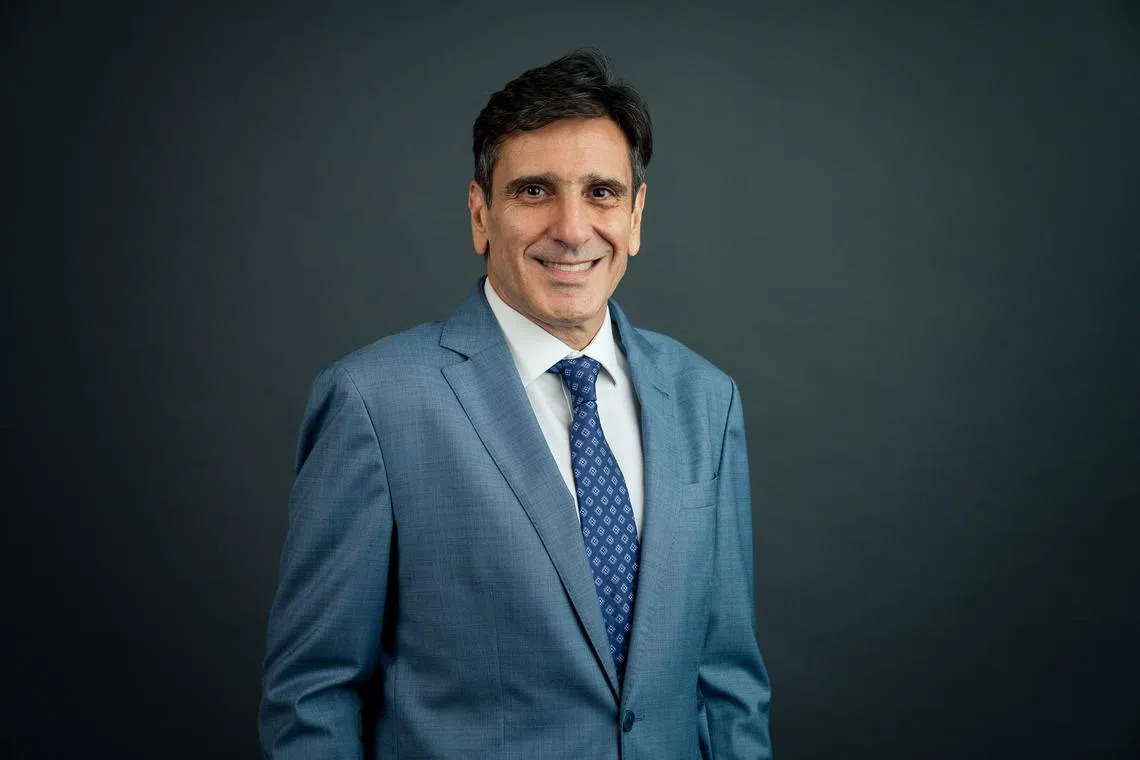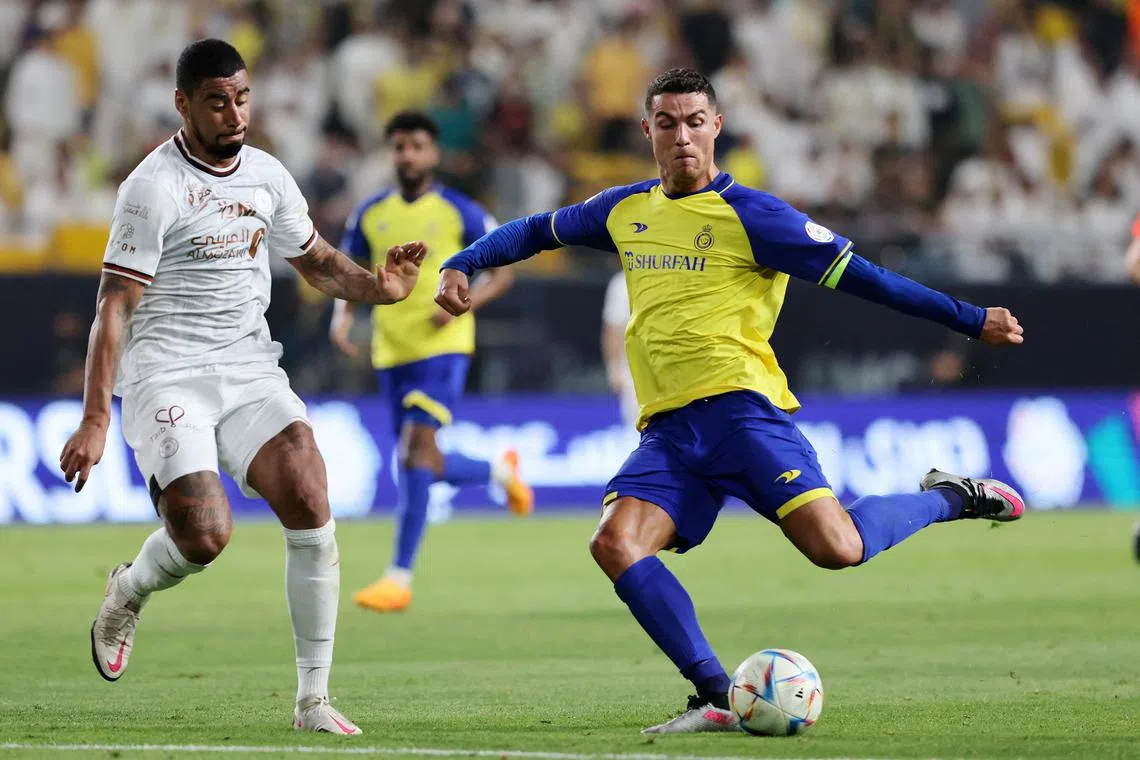Saudi Pro League wants to be among top five in the world, says senior official
Sign up now: Get the biggest sports news in your inbox

New Saudi Pro League chief operating officer Carlo Nohra wants the league to become one of the top five in the world.
PHOTO: CARLO NOHRA
Follow topic:
SINGAPORE – The Saudi Professional League is taking world football by storm with its recruitment of superstar players like Cristiano Ronaldo, Karim Benzema and N’Golo Kante. But not many know that its chief operating officer Carlo Nohra has been charting the league’s path 6,800km away, from his home in Bukit Timah.
The 55-year-old, who previously headed the World Wrestling Entertainment Asia Pacific office in Singapore, was also formerly chief executive officer of the United Arab Emirates Pro League and assistant general secretary at the Asian Football Confederation. He joined the Saudi league on May 15.
In an exclusive interview with The Straits Times, Nohra shared the league’s ambitious plan to “improve its ranking in the world leagues to become one of the top-10, if not the top-five leagues in the world in terms of a combination of player quality, revenue and viewership”.
He added: “The strategy is very long term... Simply bringing in bigger-name players doesn’t achieve it. Having mass participation, youth development, how that all fits in into clubs, and eventually all the way up to the national team is an essential component of the strategy.
“It requires development of infrastructure which Saudi desperately needs. Hosting the Asian Cup and potentially other bigger events in the future will help improve the playing standards of the Saudi players. They are near the top in Asia now, but the aspiration is to compete on the world stage.”
Established in 1976, the Saudi Pro League became professional in 2007 and teams are state funded. The most successful club are Al-Hilal, the 2022 Fifa Club World Cup runners-up who are also Asia’s most successful team in the AFC Champions League with four titles.
While Ronaldo’s Al-Nassr regularly sell out their 25,000-seater at Al-Awwal Park and Al-Hilal play at the 68,752-capacity King Fahd International Stadium, other clubs are not on the same scale with the likes of Al-Fayha’s Al Majma’ah Sports City arena seating just 7,000.
As such, last season’s average league attendance was just 9,372, even if it achieved a seasonal record attendance of 2,249,161 to top the previous best, set in 2018-19, by 11 per cent.
Portuguese superstar Ronaldo has helped extend its broadcast reach from 20 Middle Eastern countries to 170 territories worldwide, but much work needs to be done to achieve its goals. These include increasing the annual revenue from 450 million riyals (S$162 million) to 1.8 billion, and the market value to more than 8 billion riyals by 2030.

Al Nassr’s Cristiano Ronaldo in action on May 23, 2023.
PHOTO: REUTERS
In June, the league received a shot in the arm when Saudi Arabia’s sovereign wealth fund Public Investment Fund, which also owns English Premier League club Newcastle United, announced a buyout of 75 per cent of Al-Ittihad, Al-Ahli, Al-Nassr, and Al-Hilal.
When asked if this privatisation would create an imbalance in the league, Nohra, who will move to Riyadh soon, said: “What you are seeing is the transition from government dependence to complete private-sector independence of the sporting sector.
“This is an essential step that must happen in order for the football sector to become a net contributor to GDP (gross domestic product) like it should be, where at the moment it’s costing an arm and a leg for the government to shore up.
“Other clubs are not forgotten. There are plans in place eventually to lead them along this path.”
This patient and prudent approach comes after Nohra’s team studied the failure of the Chinese Super League. In 2012, big-name players and coaches like Didier Drogba and Marcello Lippi pocketed sky-high salaries to feature in China and the bubble ultimately burst as investors pulled out in the wake of the Covid-19 pandemic and corruption charges.
“That’s also why we are taking small measured steps towards privatisation rather than an all-in approach,” he added.
Noting the parallels between the Saudi and Singapore Premier League (SPL), Nohra, a Geylang International management committee member, hopes the authorities here can expedite the privatisation of the SPL clubs.
He said: “If you want a professional football environment, eventually you have to accept it needs to be shored up to a point where it can be floated into the private sector, and then let the private sector compete to ensure its longevity.
“I see a lot of trepidation in taking that step for possibly social and cultural reasons, but then you can’t delude yourself with aspirations for a professional league. The hard truth is sport is riddled with failed attempts at trying to professionalise while having the government retaining control.”
Having taken on the top job in Saudi football, the Lebanon-born Cypriot is well acquainted with its critics, as he addressed accusations of the country’s “sportswashing” to deflect from human rights violations.
He said: “Somebody’s trying to play the world police on ethics, and what we can or cannot do. But what works in one part of the world doesn’t necessarily work in other parts... The Western world doesn’t hold the moral compass for the rest of the world.
“If people can take a step back and look objectively at what the crown prince is trying to do within Saudi, I’m sure that they would all be envious to be in that position, because the government is spending... developing its own people, it’s developing the means for its own people.”

